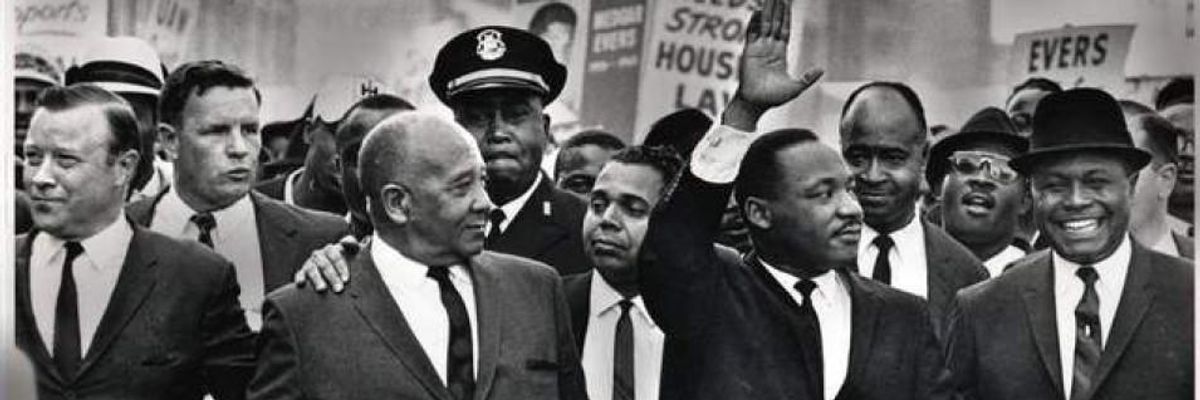Mike Pence, in his attempt the other day to commandeer the spirit of Martin Luther King to shill for his boss's agenda, unintentionally did so much more. He brought the enormity of King's vision back into national awareness, where it shattered the Trump Wall of Fear just as resoundingly as it shattered Jim Crow America more than half a century ago.
Let us once again embrace the infinite.
Speaking on "Face the Nation" the day before MLK Day, the veep said: "One of my favorite quotes from Dr. King was, 'Now is the time to make real the promises of democracy.' You think of how he changed America. He inspired us to change through the legislative process to become a more perfect union. That's exactly what President Trump is calling on the Congress to do: Come to the table in a spirit of good faith. We'll secure our border, we'll reopen our government."
This obvious co-optation of MLK -- this attempt to buddy up with an American icon -- drew a fusillade of outrage on social and other media. Martin Luther King III, for instance, said his father was "a bridge builder, not a wall builder."
When King visited Berlin in 1964, he said of that wall: "For here on either side of the wall are God's children and no man-made barrier can obliterate that fact."
But my favorite response came from Stephen Colbert, who pointed out in his "Late Show" monologue how King really felt about walls of separation. When King visited Berlin in 1964, he said of that wall: "For here on either side of the wall are God's children and no man-made barrier can obliterate that fact."
These words are not just a spew of idealism -- not when uttered by MLK -- but a cry for awareness as large as the human race is capable of, for awareness beyond politics as usual and a world cordoned off into militarized nation-states.
"Whether it be East or West," King continued that day, "men and women search for meaning, hope for fulfillment, yearn for faith in something beyond themselves, and cry desperately for love and community to support them in this pilgrim journey."
Since the Soviet Union was the perpetrator of the Berlin Wall, my guess is that King's press coverage after that speech was positive here at home. After all, it was our premiere enemy that had committed this human outrage, walling off part of a city, dividing Berlin from itself, caging human hope for a better life. But the vision King put forward went beyond the politics of the Cold War, much to the (eventual) dismay of the American liberal, pro-war establishment, which soon enough came to realize that King really believed what he said, and would put himself in harm's way for the sake of that belief.
"For here on either side of the wall are God's children . . ."
That is to say, there is no "other," no assemblage of lesser humans who must be controlled and contained and, if necessary, eliminated to advance national interests. This point is easy enough to swallow when it's in criticism of the behavior of the established enemy, but King meant it way beyond such smallness of vision. He meant it in all directions -- and paid the price for his audacity.
Merely in pursuit of racial justice, in nonviolent confrontation with the Jim Crow South and the less ostentatiously enforced racist barriers of the North, King endured numerous arrests, threats on his life and ongoing surveillance by the FBI (not to mention the personal hostility of J. Edgar Hoover); but when he took a stand against the Vietnam war, he surrendered the support of the liberal status quo, including that of Lyndon Johnson, and was banished to the national margins.
Enough was enough. "What is that goddamned (n-word) preacher doing to me?" the president is said to have shouted the day after King said these words:
"A true revolution of values will lay hand on the world order and say of war, 'This way of settling differences is not just.' This business of burning human beings with napalm, of filling our nation's homes with orphans and widows, of injecting poisonous drugs of hate into the veins of peoples normally humane, of sending men home from dark and bloody battlefields physically handicapped and psychologically deranged, cannot be reconciled with wisdom, justice, and love. A nation that continues year after year to spend more money on military defense than on programs of social uplift is approaching spiritual death."
MLK: hated in his day, but now he's a saint.
This was King's speech at Riverside Church in New York City on April 4, 1967: "Beyond Vietnam: A Time to Break Silence." No fewer than 168 newspapers -- including, of course, the major players, the New York Times, the Washington Post, et al -- denounced King after this address. How dare he make a big deal out of napalm and burnt children, out of the psychological derangement of war? He needs to stick to civil rights!
MLK: hated in his day, but now he's a saint. And 50-plus years after his death, here's Mike Pence embracing the man as though he's Santa Claus, apparently under the impression that he's now available to give blessings and endorsements anywhere along the political spectrum.
But apparently that's not the case. Martin Luther King does not fold so neatly into American history. He stands now, as he did then, as a living force for justice, in uncompromising opposition to poverty, racism and war. He stands beyond the walls we build, embracing the children on either side.

